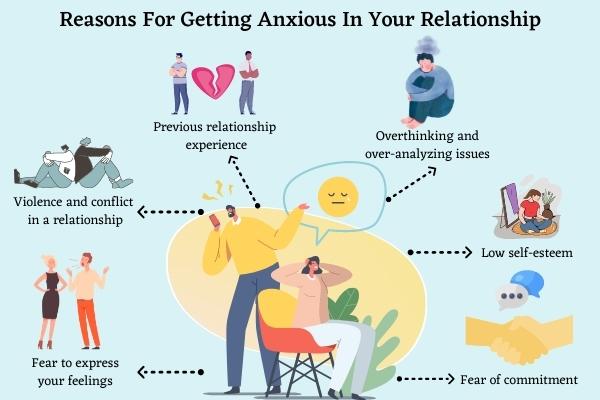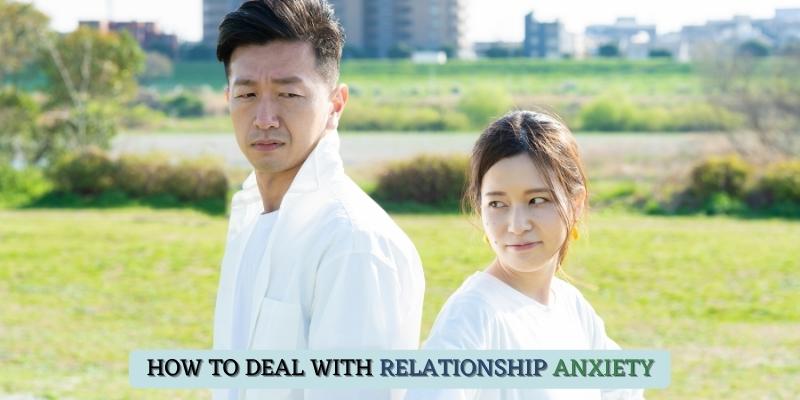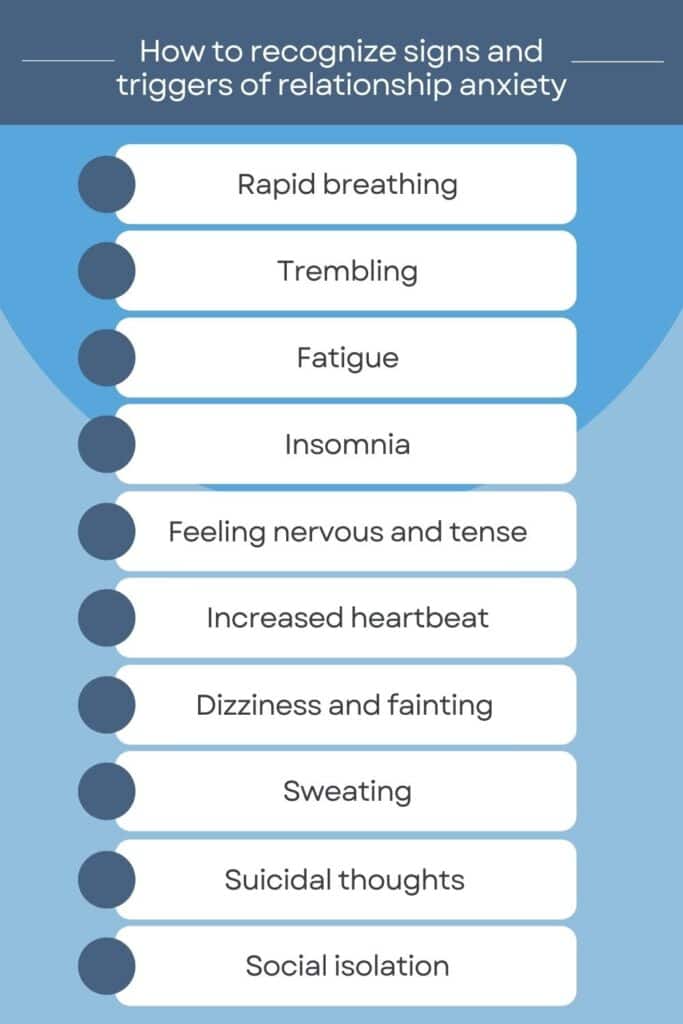“Anxiety is love’s greatest killer. It makes others feel as you might when a drowning man holds on to you. You want to save him, but you know he will strangle you with his panic.” – ANAIS NIN.
Reasons for Getting Anxious in Your Relationship.

Relationship anxiety is the feelings of worry, doubt and insecurity that may arise in a relationship even if everything is going on well. It is normal, especially in romantic relationships, and may not necessarily be a sign of an unhealthy relationship.
It is, therefore, necessary to find out when you are getting anxious, the reasons for getting anxious, how to recognize them and ways to keep your relationship free from being ruined by your anxiety.
Read more on anxiety here.
What Can Trigger Relationship Anxiety?
Some of the following reasons can be a trigger for relationship anxiety:
- Fear to express your feelings.
To build a healthy and long-term relationship, communication plays a key role. Partners should constantly communicate how they feel and how they wish to be treated. However, many times there is fear of communication. Fear of being looked down upon, of being discounted or the feelings and thoughts not being heard.
Fear creates a communication barrier between partners, making it difficult to understand one’s feelings and motives.
- Violence and conflict in a relationship.
Often quarrels and fights greatly contribute to developing anxious thoughts in a relationship. Any time an issue arises, there is fear of addressing it due to the possibility of harassment from your partner. This may lead to one developing worries and fear, thus relationship anxiety.
- Previous relationship experience.
Many times, there is a taste of sourness from previous relationships.
- Abusive relationship.
After moving from abusive relationships, many people cannot forget the harassment encountered. Vivid memories of cruel treatment remain glued in their minds. Therefore, some find it challenging to forget, move into new relationships, and think that all partners are toxic.
- Infidelity and loss of trust.
There are times when a partner may decide to look for pleasures outside the relationship, and this breaks trust. The scars of not being able to trust walks alongside the new relationship.
- Childhood and parenting.
Many children notice stress and tension in their parents’ or caregivers’ relationships. There may be infidelity, violence, abusive language, not providing a listening ear etc. Some parents end up separated or divorced. And this can be another reason for relationship anxiety.
- Fear of abandonment.
Once again, this fear will usually stems from childhood. As a child, a person may have experienced being abandoned or having feelings of not being important to their caregivers/parents. This walks along in the relationships in the present, giving rise to anxiety. You may want to explore therapy for going to the childhood roots of hurts and pains and how they impact in the ‘here and now‘.
- Overthinking and over-analyzing issues.
The inability to stop overthinking about your partner is a sign of attachment anxiety. It’s a red flag indicating that your partner is not available to connect emotionally. It is common in relationships where one is more emotionally sensitive than the other partner.
- Low self-esteem.
Research shows that it is difficult for self-doubt victims to believe another person’s feelings towards them. They always assume that the people surrounding them feel the same way they feel about themselves.
- Fear of commitment.
It’s common among those that have never been in a relationship before and those from bad relationships. They have concerns that they might miss out on ‘something else’ or be taken for granted if they fully commit themselves. Partners from toxic relationships are unwilling to fully commit themselves to avoid wasting themselves as they have previously done.
Read more about relationships under our couples blog.
Additional Reasons for Relationship Anxiety
1. Negativistic questioning of your partner’s motives.
Self-interrogation on whether the partner you have is there to stay or might leave one-day triggers anxious thoughts in a relationship. Sometimes, negative thoughts may arise due to fear of mere issues, such as the partner is good-looking and has more money than you. This makes one worry that the partner may choose another better person over him/her.
2. Compatibility doubt.
Differences in interests, character traits and behaviours may create doubt among partners about whether they are meant to be together or not. This may arise even when the relationship is moving on well. One develops a fear of incompatibility because they cannot fit into the partner’s interests.
3. Attachment difficulties from an earlier age.
The poor and inconsistent response towards one’s needs in childhood stages contributes to a less secure attachment style. As a result, the child matures with relationship anxiety, not expecting better treatment and maintains the same motive even in adult relationships.
4. Financial stress.
Unemployment and low salaries lead to one feeling guilty of not meeting the needs of family and partner. As a result, one may feel a burden in the relationship, thus contributing to relationship anxiety.
5. Loss of trust.
Trust is the main pillar of any strong relationship. However, sometimes relationship challenges such as infidelity and dishonesty of one or both partners may lose trust. As a result, the relationship is significantly weakened, and overwhelmed by anxious thoughts. In most cases, such relationships end unless a competent third party is involved to help restore the lost trust.
6. Behaviours from fellow partners.
Contrary to the other partner, some partners may be too secretive or talkative. This creates a feeling of worry as one feels that he/she is not trusted in the relationship.
How to Recognize Signs and Triggers of Relationship Anxiety.
As highlighted, relationship anxiety often comes with varied physical, emotional, and health signs. The signs can be noticed by oneself or by a close observer such as a licensed anxiety therapist.
Some of the signs to be noticed are;
1. Rapid breathing.
2. Trembling.
3. Fatigue. (feeling weak and tired)
4. Insomnia. (sleeping difficulty)
5. Feeling nervous and tense.
6. Increased heartbeat.
7. Dizziness and fainting
8. Sweating.
10. Social isolation.
Ways to Keep Anxiety from Ruining Your Relationship.

Since anxiety is an expected enemy to healthy relationships, partners can learn to overcome anxiety. Some ways to do it will be:
1. Find out the triggers of your underlying anxiety with the help of a professional therapist.
This you can apply appropriate mechanisms to overcome anxious feelings. Therapy helps one to process their thoughts and feelings and make informed decisions. Make sure that you faithfully share all the required information to get effective therapy. Once there is awareness, you have a choice to make the desired changes.
2. Employ honesty and openness with your partner.
When free flow of communication is not permitted, seeking couple counselling is beneficial. Learn to talk to your loved one about how you feel and think. Through this, you calm your fears and worries, remembering “a problem once shared is half solved.”
3. Use self-soothing activities when anxiety is at its extreme level.
Engage in an activity that involves your five senses. This aims at making you relaxed and free from anxious thoughts, e.g., jogging, walking, dancing, etc. You can also immediately distract your mind by doing some grounding exercises.
4. Accept that though your feelings may be valid, they may not necessarily be the truth.
Many times it helps to understand the triggers of negative feelings and thoughts. Instead of ignoring the part of you that is feeling victimized or ashamed, or negative, you may want to gently understand the reasons behind these feelings. You may want to talk to a friend, family member or counsellor to help you process these thoughts and move towards the healing path.
5. Address conflict of difference in opinion.
As partners in a relationship, always strive to reach a mutual understanding when a conflict of opinion arises. Many times, you may notice a Critical Parent part of you may not be okay with the way your partner talks or does things. Or your Child part may want to rebel when a partner criticizes your opinion. Take a pause and step back. Learn about effective ways to communicate with your partner.
6. Build solid trust with your partner.
Mistrust is a great threat to relationships and the main initiator of relationship anxiety. Avoid suspecting your partner by communicating in an Adult manner instead of hiding your suspicions or putting everything under the carpet. You may want to ensure there is honesty in your relationship.
7. Start a fresh start.
Whenever you feel like relationship anxiety is killing your relationship, choose to go back and begin a new relationship chapter. Ignore all the memories you’ve had earlier and assume that you’ve just started a new one. Instead, concentrate on building new and stronger memories.
Conclusion
In conclusion, relationship anxiety is normal in any relationship but can be dangerous when it persists to extreme levels. In order to have a long-term healthy relationship, partners must find out the underlying causes of relationship anxiety at an earlier stage. This enables earlier address of the issues with the help of a professional therapist. Furthermore, earlier talk of these issues saves the relationship from possible quarrels, harassment, fights and relationship break-ups.
References
Learning How to Cope With Relationship Anxiety – Verywell Mind











